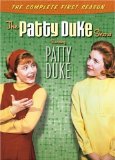| Reviews & Columns |
|
Reviews DVD TV on DVD Blu-ray 4K UHD International DVDs In Theaters Reviews by Studio Video Games Features Collector Series DVDs Easter Egg Database Interviews DVD Talk Radio Feature Articles Columns Anime Talk DVD Savant Horror DVDs The M.O.D. Squad Art House HD Talk Silent DVD
|
DVD Talk Forum |
|
|
| Resources |
|
DVD Price Search Customer Service #'s RCE Info Links |
|
Columns
|
|
|
Patty Duke Show: The Complete First Season, The
A light and sweet fantasy - the very definition of "wholesome," I would think - and expertly played. Shout! Factory should again be applauded for continuing to release classic vintage TV series from the 60s' "second golden age" of television, with perennial favorite, The Patty Duke Show: The Complete First Season, nicely carried over onto this six-disc set. All 36 (!) episodes from the premiere 1963-1964 season are here, and they appear to be fully intact. There's also a brand-new documentary on the series, featuring recent interviews with of the surviving cast, as a bonus.
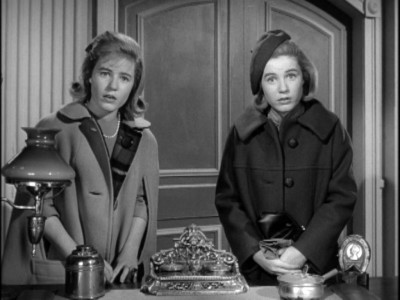
In the upper-middle class borough of Brooklyn Heights, New York, there's double trouble every day at the Lane household. Typical boy-crazy American teenager Patty Lane (Patty Duke) can't sit still for a minute: she's either on the phone, talking to her pals, or rustling up something to eat, or slobbing around in her messy bedroom, or hanging out with her boyfriend, goofball Richard Harrison (Eddie Applegate). Keeping a watchful eye over her enthusiastic antics are her strict but humorous mother, Natalie (Jean Byron), and her understanding, loving father Martin (William Schallert), who's a big-wheel editor for The New York Daily Chronicle. Younger brother/pest Ross (Paul O'Keefe) is a formidable foe to Patty's sanity around the house, particularly when he has a ready dry wisecrack available at the drop of a hat - at Patty's expense, of course. However, one additional element is added to this utterly conventional TV-nuclear family which turns it on its ear: the arrival of Patty's identical cousin, Cathy (Patty Duke again, of course). Identical because their fathers are identical twins (Schallert portrays Martin's brother Kenneth in one of the episodes this season), Cathy comes from Scotland to live with her uncle and his family so she can learn about America as her foreign correspondent father travels the globe. Naturally, sometimes-scheming, slightly-crazy Patty sees the advantages of having an identical cousin (fooling dates, for one), but demur, intellectual, stable Cathy often steers Patty back on the right track, acting almost like Patty's conscience whenever one of her schemes backfires.
The Patty Duke Show in its original run from 1963 to 1964 was before my time, but it was a staple of my childhood syndicated afternoon line-ups during the early 70s, before it enjoyed a resurgence in 1988 when it played regularly on the then-cool Nick at Nite schedule (what has happened to that channel?). I suspect new viewers to the series back in the late 80s enjoyed it as a time-capsule goof (that was the general vibe of the channel, and how they sold their schedule), but as kids, we took it "straight." We knew it was an "old" show because it was in black and white, and all the slang was hopelessly out of date (it may even have been out of date or phoney in 1963, as well), but it occupied that strange syndicated twilight of unreality and acceptance for old shows that so many kids my age experienced. We knew these shows had already come and gone, but once they began emdless syndicated reruns, they then existed in some weird limbo of currency. Watching the show now, I have too many layers of experience with it (and other shows from that time period, as well) to take it as a "new" encounter, so I'm not sure how it would go over with a viewer not familiar with either it, or with that whole vintage TV gestalt. I can say my seven-year-old daughter enjoyed it just for what it is. She doesn't really comprehend that it's a 40+ year-old series; she just thinks Patty Duke is this funny young girl who gets into trouble sometimes with her parents - not exactly a foreign concept to her (a couple of my younger boys immediately hit the road after the first episode). Taken on that very basic level, The Patty Duke Show must have been doing something right during its production, because it hits the same buttons today it hit way back when.
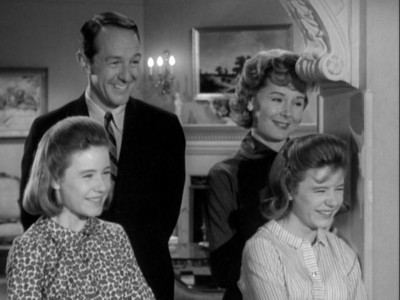
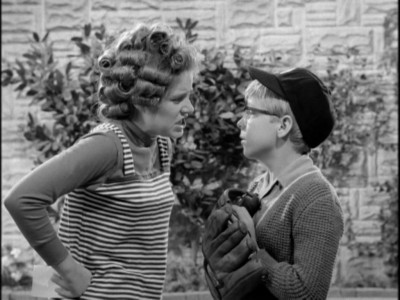
Knowing the backstory of the show, it's a little more difficult to enjoy it as a farcical light romp, considering the genuinely painful childhood that Patty Duke endured during its production. Controlled and isolated by a couple who micro-managed her career and personal life (to the point where she had no life to speak of except in front of the camera), The Patty Duke Show wasn't even a project Duke was asked to do: she had absolutely no say in anything that happened in her life. Duke, a genuine child actor phenomenon on the Broadway stage as Helen Keller in The Miracle Worker with Anne Bancroft, had been approached to star in a television series just prior to the release of the filmed version of the play - resulting in a performance by Duke that garnered her a well-deserved Best Supporting Actress Oscar (it's still an electrifying turn, and certainly one of the best child performances ever caught on film). Created by Sidney Sheldon (before he went on to write mammoth best-selling potboilers like The Other Side of Midnight) and William Asher (who would direct the opening episodes of this first season before moving on to shepherd Bewitched with his wife, Elizabeth Montgomery), the youth-oriented The Patty Duke Show would be a natural fit with upstart ABC, who never led overall in the ratings and who could subsequently afford to take chances with a series centered around such a young actress. Going into a sitcom with an Academy Award-winner as its lead was a big coup for ABC, and the subsequent hype - along with the final, polished product - helped the series gain big ratings its first time out. Debuting on September 18, 1963, in its series-long time slot of Wednesdays at kid-friendly 8:00pm, The Patty Duke Show held its own against rising Western series The Virginian, scoring 18th for the entire season versus The Virginian's 17th overall in the Nielsen, with The Patty Duke Show even elevating its lead-in series, The Adventures of Ozzie and Harriet, into the Nielsen's coveted Top Thirty for the first and only time during its long 14-year run.
With almost every episode of the series written by co-creator Sidney Sheldon, The Patty Duke Show remains remarkably consistent in its aims and execution (Shout!'s handy little booklet included with this set makes much of William Asher's contributions, but director Stanley Praeger directed most of these first season episodes). And while it's not exactly a laugh-out-loud, frenetic sitcom such as any of Lucille Ball's efforts, it is highly polished and skillful, in a gentle, sweet manner (it's almost...sedate). Filmed in New York to take advantage of the-then weak child labor laws when it came to actors (Duke would routinely work 12-hour days, as opposed to the strict 4-hour days in Hollywood - nice managers, huh?) - a rarity by this point in television when almost everything was shot out in Hollywood - The Patty Duke Show does have an almost imperceptible "otherness" to its atmosphere in that it doesn't quite look or sound or "feel" like other Hollywood-based sitcoms from that time period. Maybe that's where the show's certain..."stillness" comes from (the use of time-consuming split-screen special effects probably added to the measured tone of the piece: you can't horse around and be spontaneous if you have to match up mattes and eye-lines). The show's raucous, almost insane theme song (one of TV's most memorable, I would imagine) certainly suggests mayhem and unfettered abandon when it promotes the coming complications when identical cousins live together ("YOU CAN LOSE YOUR MIND!" it warns maniacally), but in actuality - at least in this first season - the hijinks are much more measured.
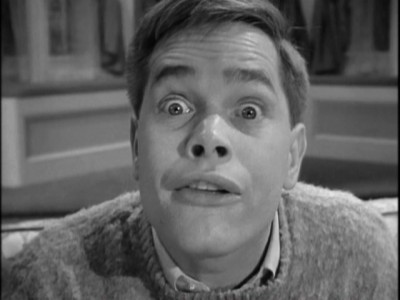
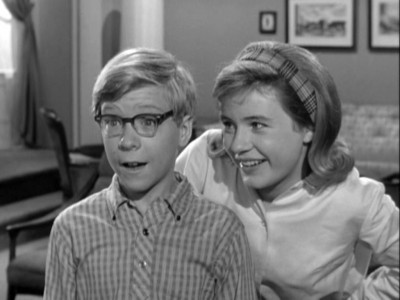
A couple of times the central hook for the show - identical cousins living together can cause havoc - is utilized, but for the most part, that theme is pushed aside in favor of plots revolving around brash American Patty rushing headlong into a situation (usually featuring Richard or some other school-related activity), with calm, sensible Cathy helping to extricate her in the end. Quite often, that wonderful stereotypical cliché of the American teenager of the late 50s-early 60s - torn between all-American basketball games and getting pinned by a steady boyfriend or girlfriend, and wistfully wishing for "culture" in more sophisticated pursuits, especially if they involve France - is on display here. After all, that characterization of the cultural dichotomy of the average American teen is present in the very format of the show: "Where Cathy adores a minuet, the Ballets Russes, and crepes Suzette, our Patty loves to rock 'n' roll, a hot dog makes her lose control...." It's unfortunate that either the writers or Duke herself couldn't enliven this debate through a stronger Cathy character (animated Patty steals the show from almost-dour Cathy in every episode), but this was, after all, a show that Duke states everyone involved with knew was a throwaway.
I'm sure some modern critics might have a field day with supposed "outdated" modes of representing the average teenager's life and concerns as they are found in The Patty Duke Show, but aside from the obvious idealized aspects of the series which are part-and-parcel of traditional sitcom conventions (no "too real," messy problems that can't be solved in 25 minutes - and none of the boredom inevitably found in everyday life, either), I didn't see anything here that seemed inordinately fantastic. Patty is portrayed as slightly selfish at times, warm and caring at other times; she's rowdy, funny, smart-assed on occasion; she fights with her younger brother and looks to do him serious bodily harm on more than one occasion; she's lazy and she's a go-getter; she's sloppy, sometimes scheming...and basically decent and honest. In other words, she doesn't sound any different than countless numbers of teens today. The slang may be different, and the pressures from within the family and without may be more acute today, but the core essence of Patty doesn't seem too alien to today's monsters. The circumstances are idealized and quaint and anachronistic, but the emotions are pretty timeless (the episodes usually have a scene where one character connects on an emotional level with another, and it's very sweetly and sincerely executed). Patty's parents, Martin and Natalie, are refreshingly "normal," as well...within the confines of the idealized TV nuclear family. Martin isn't above scolding Patty and letting her take her lumps as a lesson hard-learned, while Natalie suffers no illusions about the surprising amount of guile and subterfuge present in the average American teenager - no matter how cute how they act on occasion (Byron has a great moment in the opener when, after Martin wonders aloud if she's being too harsh on Patty, she sneers almost meanly, "No! I don't care what Dr. Spock says. I say you have to grind them under your heel or else they'll rise up and get you!" So much for "idealized nonsense.")
The cast is an enormous help, too, with material that sometimes could be described as "slight." Duke obviously carries the majority of the show's weight on her shoulders, and she's just marvelous at Patty. Duke, ferocious in drama even at this early age (she was just 16), proved to be equally adept at comedy. While Duke herself didn't particularly like her own turn in the series (from all the interviews I've read, as well as her bio, if I recall), I found her charming as the rambunctious Patty. Duke, far prettier than the producers were really willing to let her be here in this series, gets laughs anytime she screws up that pretty face into a petulant or uncomprehending goof while spouting the latest slang (Duke admitted later she had no idea how to play a typical American teen, because of her restrictive personal life). All those young years of theatre training helps with the physical stuff, as well, which she pulls off with her dignity intact (and don't even get me started about her one song number this season, Tell Me, Mama -- a seminal moment in pop TV culture). Schallert and Byron are right in synch with the rhythm of the piece; they're certainly not stretched as far as their talents go, but their professionalism is noticeable in this kind of fluff. And I must say that I was most impressed with Paul O'Keefe as the younger pest, Ross. Looking like a pint-sized Woody Allen - while getting off Woody Allen-worthy one-liners with aplomb - O'Keefe just somehow looks and acts like a true New Yorker, with his casual delivery nonchalantly thrown out underneath those appropriately annoying horned-rims. When Martin and Natalie go to see Patty perform in a school play, and Natalie exclaims, almost incredulously, "Patty's surprisingly good," Ross dryly returns, "Boy that's a mother's love." Priceless delivery. And equally funny is Eddie Applegate as the goofball Richard. That's a tough character to essay: he has to be Patty's romantic boyfriend, but he also has to be the comic relief. And he pulls it off beautifully. Acting broadly, Applegate's Richard is part ravenously-hungry teen, part slow-witted boob, and half ape, apparently. We'll see how all of these elements continue to evolve - if indeed they will - in the next two seasons of The Patty Duke Show.
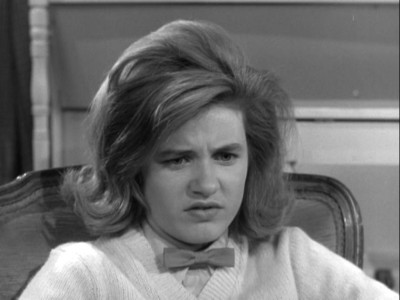

Here are the 36 (!) episodes of the four-disc set, The Patty Duke Show: The Complete First Season, as described on its enclosed pamphlet. PLEASE NOTE: As far as I can tell, all of the episodes - save one...maybe - appear complete in this set. All run times are well over 25 minutes (which is in line with network times for half-hour shows in 1963). The only variation I saw on that was episode 12, How To Be Popular, which ran 24:30 - still well within the range of a correct, "complete" run time. The episode does just...end (or at least it seemed that way), but that in no way suggests to me, definitively, that the episode has been edited. It may or may not have been, but that run time isn't off enough for me to say either way with certainty. I'll let The Patty Duke Show experts weigh in on that one. Considering how often we get edited vintage TV series on disc nowadays, I think it's important to point out it's rather remarkable that we have a lesser-tier series like The Patty Duke Show presented (I believe) intact. Kudos to Shout! Factory.
DISC 1
The French Teacher (9/18/1963)
Patty's poor grades improve suddenly when she takes an interest in her French class...thanks to a new substitute teacher she has a crush on.
The Genius (9/25/1963)
When the school gives an I.Q. test, Patty scores off the chart. Is she a genius, or is someone tampering with the computer?
Elopement (10/2/1963)
When Patty is seen by her father's boss at the licensing office with Roger, it looks like they are getting a marriage license and planning to elope.
House Guest (10/9/1963)
Bossy Aunt Paulina stops in for her annual visit, and the household is turned upside down.
The Birds & The Bees Bit (10/16/1963)
When Ross is asked (or more like "told") to go to the school dance by a new, forceful student, Patty and Cathy help teach him about girls.
Slumber Party (10/23/1963)
"Benedict" Ross tape-records some conversations during Patty and Cathy's slumber party and uses the recordings to blackmail the girls.
DISC 2
Baby Sitters (10/30/1963)
To raise enough money to buy an evening gown for the dance, Patty goes into the babysitting business - with chaotic results.
The Conquering Hero (11/6/1963)
When the star high school basketball player's parents decide to move away before the season is over, Cathy convinces her dad to let him move into the house.
The President (11/13/1963)
Patty and Cathy reluctantly run for girl's league president, and once the campaign begins, so does the mudslinging.
Double Date (11/20/1963)
Cathy ends up getting a double flu vaccination when she mistakenly receives Patty's shot in addition to her own. Now Patty has to go on two dates.
The Actress (11/27/1963)
Patty is bitten by the acting bug when she tags along to the auditions for Antony and Cleopatra with Cathy and Richard and ends up with the lead role that her sister had hoped for.
How To Be Popular (12/4/1963)
Cathy decides that she needs to learn how to become popular like Patty, so she writes to advice columnist Aunt Jane. Aunt Jane sends a copy of her book You Can Be Popular, but calamity ensues when Cathy starts to follow the book's advice.
DISC 3
The Songwriters (12/11/1963)
Patty thinks she is losing Richard to Sue Ellen, so she copies a poem from a book and sends it to him. Cathy finds the poem and puts it to music, then enters it in the Jimmy Dean songwriting contest.
The Princess Cathy (12/18/1963)
Cathy and Patty compete for the affections of a new "dreamboat" foreign exchange student who is from a royal family.
The Christmas Present (12/25/1963)
Cathy is excited that her father is coming for Christmas, but he ends up in prison in another country just days before his scheduled arrival.
Auld Lang Syne (1/1/1964)
J.R. "Just Rotten" Castle fires Martin's brother Kenneth on Christmas. Cathy thinks that if Kenneth writes a best-selling book, Castle will hire him back - so Patty and Cathy set out to get him a book deal.
Horoscope (1/8/1964)
When two horoscope predictions she makes come true, Patty sees this as an opportunity to make some money as an astrologer.
The Tycoons (1/15/1964)
All the girls at school love a dress that Cathy made. Patty gets the bright idea that they can go into the dressmaking business, but Cathy is not crazy about the thought of becoming a one-woman sweatshop.
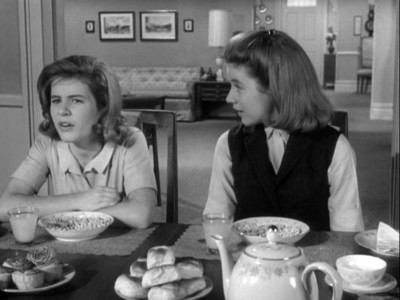
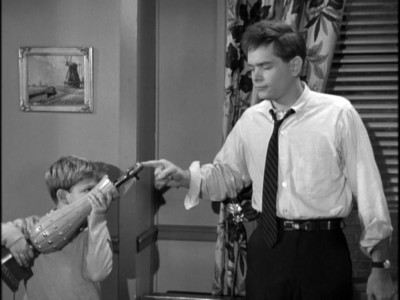
DISC 4
Author, Author (1/22/1964)
When a French teenager writes a bestseller, Patty decides to write a novel from the viewpoint of an American teenager and garners interest from a shady publisher.
The Continental (1/29/1964)
Martin is being transferred to Paris to run the international bureau. At first it sounds like a great idea to the family - until they realize what they will leave behind.
Let 'Em Eat Cake (2/5/1964)
Patty and Cathy eat part of a cake that Natalie made to enter in a church bazaar contest, so the girls decide to take a stab at baking a replacement with the assistance of Ross.
Going Steady (2/12/1964)
Patty and Richard decide to go steady, but their parents think they are too young and conspire to change their minds.
Are Mothers People? (2/19/1964)
Natalie starts to feel unappreciated by the family for all the work she does and devises a plan with one of her friends to call attention to herself, but unfortunately it backfires.
The Con Artists (2/26/1964)
When Cathy pays too much for a vacuum cleaner from a smooth-talking door-to-door salesman, Patty steps in to help get her out of the deal - but she only makes matters worse.
DISC 5
The Perfect Teenager (3/4/1964)
When Patty fails a quiz in a magazine on "How Do You Rate as a Teenager," she takes a modeling coarse to boost her confidence.
Chip Off the Old Block (311/1964)
Patty becomes the editor of the school newspaper, but instead of modeling the publication after her father's, she turns the paper into a tabloid rag.
Wedding Anniversary Caper (3/18/1964)
Ross wants to get his parents something special for their anniversary, but since he has no money, he enters Patty in a beauty contest hoping to collect the prize winnings.
Slight Case of Disaster (3/25/1964)
In order to show up archrival Sue Ellen, Patty buys an expensive dress that she can't afford. She plans to return it after the dance, but of course things don't go as planned.
Pen Pals (4/1/1964)
Patty answers a pen pal ad in a magazine and gets so enamored with her new pen pal that she loses interest in Richard.
The Friendship Bit (4/8/1964)
Patty can't stop sneezing. After a series of tests, her doctor proclaims she's allergic to Cathy.
DISC 6
Patty the Foster Mother (4/15/1964)
For a school project, Patty becomes a foster parent for an orphan in Korea, but she accidentally adopts the young boy after signing some paperwork.
Drop Out (4/22/1964)
Richard decides to drop out of school and get a job. In order to convince Richard to continue his education, Patty pretends she is going to quit school, but Richard thinks it's a great idea.
Leave It to Patty (4/29/1964)
Patty wins the position of chairwoman of the prom, beating out rival Sue Ellen by promising a celebrity guest. Now she has to find one.
The Little Dictator (5/6/1964)
When Cathy becomes the principal of the high school for a week, she also teaches a class. Patty is reprimanded for disrupting the class, igniting World War III between the cousins at home.
The Working Girl (5/13/1964)
Patty gets a job at the local ice cream parlor. She loves the money, but not all the work that goes with it.
Cousins (5/20/1964)
Patty and Cathy reminisce about Cathy's arrival at the Lane household.
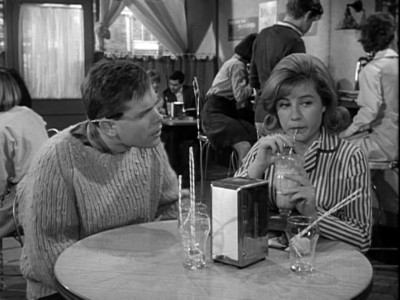
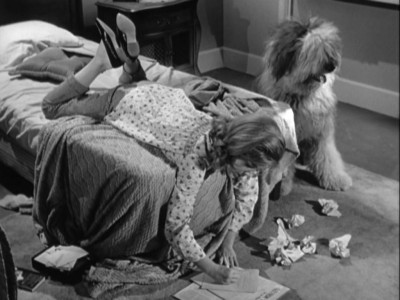
The DVDs
The Video
The full-frame, 1.33:1 black and white video transfers for The Patty Duke Show: The Complete First Season look about on a par with what I expected. I don't ever remember the show looking deeply black and white in any reruns, and that kind of grayish, overcast look is present here, with a sharper image, of course, due to disc. Screen anomalies are present, but minimal, while compression isn't a big concern, either (some minor edge enhancement the bigger you go up in monitors). All in all, these episodes looked far better than I every saw the show before, so again, nice job, Shout! Factory.
The Audio
The English mono audio tracks for The Patty Duke Show: The Complete First Season are another matter. Levels are all over the place, with the sound frequently coming in muddy. Not on a par with the video. Close-captions are available.
The Extras
Coming in at 13:47, A Look Back at The Patty Duke Show features all-new interviews with the remaining cast members of the show. Duke, Schallert (who looks terrific), Applegate, and O'Keefe all contribute (Byron passed away some years ago), and they seem to have nothing but fond memories of the show (Duke has noticeably mellowed about a show she used to speak of with not much more than slight contempt). It's not a long doc, but it covers most of the basics about the series, and just from a fan's standpoint, it's nice to see all the actors happy and well.
Final Thoughts
The Patty Duke Show won't ever finish on any list of the top ten greatest sitcoms of all time, but it's a charming trifle, a time-capsule back to a (TV-land) time of more innocence and sweetness in network offerings. The cast is superior, particularly Duke, who can do no wrong with her instantly loveable American teenager Patty Lane. Shout! Factory has gathered together complete episodes - a rarity in today's vintage TV marketplace - so fans of the series who only know it from chopped-up syndicated reruns might have a few surprises in store for them. Funny and light, and perfectly pitched, I highly recommend The Patty Duke Show: The Complete First Season. And as slangy Patty would say, "Bye-eeee!"
Paul Mavis is an internationally published film and television historian, a member of the Online Film Critics Society, and the author of The Espionage Filmography.


|
| Popular Reviews |
| Sponsored Links |
|
|
| Sponsored Links |
|
|
| Release List | Reviews | Shop | Newsletter | Forum | DVD Giveaways | Blu-Ray | Advertise |
|
Copyright 2024 DVDTalk.com All Rights Reserved. Legal Info, Privacy Policy, Terms of Use,
Manage Preferences,
Your Privacy Choices | |||||||









